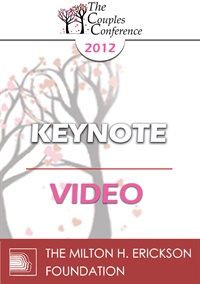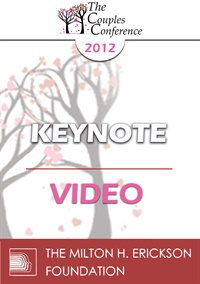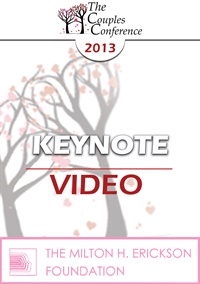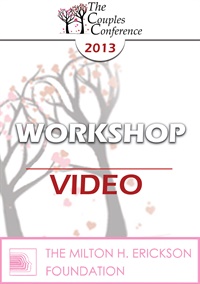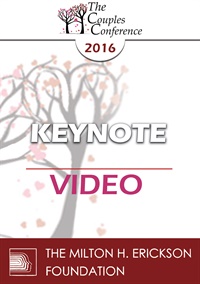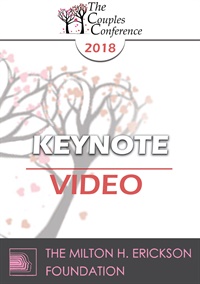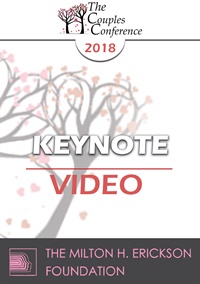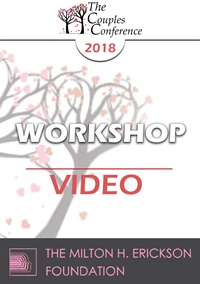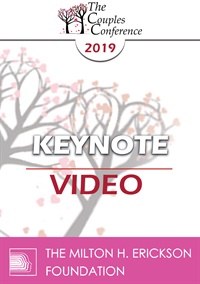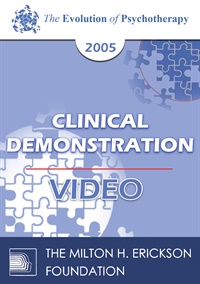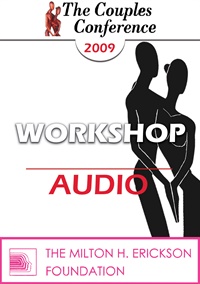
- Average Rating:
- Not yet rated
- Topic Areas:
- Workshops | Couples Therapy | Neuroscience | Research
- Categories:
- Couples Conference | Couples Conference 2009
- Faculty:
- Pat Love, EdD
- Duration:
- 1:22:34
- Format:
- Audio Only
- Original Program Date:
- May 01, 2009
- Short Description:
- Current research from the field of neurophysiology confirms the fact that permanent change involves treating the system as well as the symptom. Come learn a simple, yet impactful way to help couples break old patterns by forming new ones. Lecture, demonstration, video and experiential exercise will be used.
- Price:
- $15.00 - Base Price
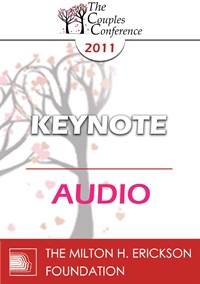
- Average Rating:
- Not yet rated
- Topic Areas:
- Keynotes | Neuroscience | Couples Therapy | Therapeutic Relationship
- Categories:
- Couples Conference | Couples Conference 2011
- Faculty:
- Daniel Amen, MD
- Duration:
- 2:12:44
- Format:
- Audio Only
- Original Program Date:
- Apr 01, 2011
- Short Description:
- This keynote explores how understanding individual brain types can transform treatment for mood, anxiety, and relationship challenges. Participants learn how neuroimaging reveals distinct patterns linked to impulsivity, rigidity, and emotional reactivity, and how tailored interventions—from exercise and nutrition to supplements and psychotherapy—can restore balance. The session offers a practical, brain-based approach to improving mental health, relationships, and overall well-being.
- Price:
- $15.00 - Base Price
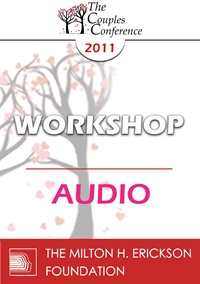
- Average Rating:
- Not yet rated
- Topic Areas:
- Attachment | Couples Therapy | Neuroscience | Workshops | Developmental Therapy Model | Differentiation
- Categories:
- Couples Conference | Couples Conference 2011 | Pioneers in Couples and Family Therapy
- Faculty:
- Ellyn Bader, PhD
- Duration:
- 1:12:19
- Format:
- Audio Only
- Original Program Date:
- Apr 01, 2011
- Short Description:
- A workshop exploring couples therapy through developmental, attachment, and neuroscience lenses. Learn to identify communication barriers, understand relationship stages, and help couples develop effective coping strategies. Includes practical tools, video demonstrations, and interactive exercises to enhance therapeutic interventions.
- Price:
- $15.00 - Base Price
- Average Rating:
- Not yet rated
- Topic Areas:
- Keynotes | Attachment | Couples Therapy | Neuroscience | Differentiation
- Categories:
- Couples Conference | Couples Conference 2012 | Pioneers in Couples and Family Therapy
- Faculty:
- Ellyn Bader, PhD | Peter Pearson, PhD
- Course Levels:
- Master Degree or Higher in Health-Related Field
- Duration:
- 40:20
- Format:
- Audio and Video
- Original Program Date:
- Apr 27, 2012
- Short Description:
- A dynamic exploration of couples therapy that delves into neuroscience, attachment, and relationship growth. Bader and Pearson examine how brain survival instincts can impede connection. They introduce differentiation techniques and demonstrate how couples can overcome communication barriers through understanding, empathy, and collaborative teamwork. Engaging video demonstrations and a compelling case study illuminate the complex dynamics of intimate relationships.
- Price:
-
Sale is $29.00
price reduced from Base Price - $59.00
- Average Rating:
- Not yet rated
- Topic Areas:
- Keynotes | Couples Therapy | Love | Neurobiology | Neuroscience | Relationships
- Categories:
- Couples Conference | Couples Conference 2012
- Faculty:
- Helen E. Fisher, PhD
- Course Levels:
- Master Degree or Higher in Health-Related Field
- Duration:
- 58:07
- Format:
- Audio and Video
- Original Program Date:
- Apr 29, 2012
- Short Description:
- Anthropologist Helen Fisher uses her brain scanning studies (fMRI) of people happily in love, rejected in love and in love long-term to discuss the traits of romantic love, love-at-first-sight, and addiction to love. She focuses on her current research on 40,000 men and women to propose that four broad cognitive/behavioral personality trait constellations have evolved associated with the neural systems for dopamine, serotonin, testosterone and estrogen. Then she discusses her data on mate choice among 28,000 individuals to pro-pose why we are chemically drawn to one person rather than another.
- Price:
-
Sale is $29.00
price reduced from Base Price - $59.00
- Average Rating:
- Not yet rated
- Topic Areas:
- Psychotherapy | Keynotes | Intimacy | Mindfulness | Love | Couples Therapy | Neuroscience
- Categories:
- Couples Conference | Couples Conference 2012
- Faculty:
- Rick Hanson, PhD
- Course Levels:
- Master Degree or Higher in Health-Related Field
- Duration:
- 59:50
- Format:
- Audio and Video
- Original Program Date:
- Apr 29, 2012
- Short Description:
- To compensate for the brain’s innate negativity bias – making it like Velcro for negative experiences but Teflon for positive ones, which sensitizes couples to hurts and conflicts and undermines psychotherapy – we’ll explore a vital method in self-directed neuroplasticity: identifying key positive experiences and then registering them deeply in implicit memory.
- Price:
-
Sale is $29.00
price reduced from Base Price - $59.00
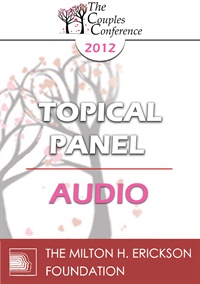
- Average Rating:
- Not yet rated
- Topic Areas:
- Attachment | Couples Therapy | Neuroscience | Topical Panels | Therapist Development
- Categories:
- Couples Conference | Couples Conference 2012 | Pioneers in Couples and Family Therapy
- Faculty:
- Rick Hanson, PhD | Harville Hendrix, PhD | Stan Tatkin, PsyD, MFT | Scott R. Woolley, PhD
- Duration:
- 59:38
- Format:
- Audio Only
- Original Program Date:
- Apr 28, 2012
- Short Description:
- This panel explores how attachment theory and neuroscience shape couples therapy. It emphasizes the importance of secure bonds, therapist presence, emotional attunement, and brain-based insights into relational dynamics. Panelists examine how early attachment, brain function, and cultural context influence therapeutic effectiveness.
- Price:
- $15.00 - Base Price
- Average Rating:
- Not yet rated
- Topic Areas:
- Keynotes | Love | Couples Therapy | Polyvagal Theory | Intimacy | Neuroscience | Relationships
- Categories:
- Couples Conference | Couples Conference 2013
- Faculty:
- Stephen Porges, PhD
- Course Levels:
- Master Degree or Higher in Health-Related Field
- Duration:
- 56:26
- Format:
- Audio and Video
- Original Program Date:
- Apr 20, 2013
- Short Description:
- The Love Code provides a metaphor to explore the neural mechanisms underlying how and why we attach, bond, fall in love and seek out safe and trusted others in an unsafe world. This presentation will explore the body’s need for intimate engagement and social bonding from an adaptive perspective. Within the theoretical context of the Polyvagal Theory, the presentation will illustrate how specific features in our social environment may trigger neurophysiological systems, through a process of “neuroception,” that enables us either to be fearful and disengage or to feel safe and enter enduring intimate relations.
- Price:
-
Sale is $29.00
price reduced from Base Price - $59.00
- Average Rating:
- Not yet rated
- Topic Areas:
- Workshops | Trauma | Couples Therapy | Neuroscience
- Categories:
- Couples Conference | Couples Conference 2013
- Faculty:
- Stephen Porges, PhD
- Course Levels:
- Master Degree or Higher in Health-Related Field
- Duration:
- 1:55:37
- Format:
- Audio and Video
- Original Program Date:
- Apr 21, 2013
- Short Description:
- The workshop will explore how faulty neuroception can have an impact on autonomic regulation and social behavior and how understanding the features that trigger different neuroceptive states (safety, danger, and life threat) can be used as a strategy of treatment.
- Price:
-
Sale is $29.00
price reduced from Base Price - $59.00
Tags: Couples Therapy Neuroscience
- Average Rating:
- Not yet rated
- Topic Areas:
- Neuroscience | Addiction | Keynotes | Love | Couples Therapy
- Categories:
- Couples Conference | Couples Conference 2016
- Faculty:
- Helen E. Fisher, PhD
- Course Levels:
- Master Degree or Higher in Health-Related Field
- Duration:
- 01:55:21
- Format:
- Audio and Video
- Original Program Date:
- May 13, 2016
- Short Description:
- Biological anthropologist Helen Fisher discusses three brain systems that evolved for mating and reproduction: the sex drive; feelings of intense romantic love; and feelings of deep attachment to a long term partner. She then focuses on her brain scanning research (using fMRI) on romantic rejection and the trajectory of love addiction following rejection. She concludes with discussion of the brain circuits associated with long-term partnership happiness and the future of relationships in the digital age—what she calls “slow love.”
- Price:
-
Sale is $29.00
price reduced from Base Price - $59.00
- Average Rating:
- Not yet rated
- Topic Areas:
- Neuroscience | Topical Panels
- Categories:
- Couples Conference | Couples Conference 2016 | Pioneers in Couples and Family Therapy
- Faculty:
- Stan Tatkin, PsyD, MFT | Pat Love, EdD | Helen E. Fisher, PhD
- Course Levels:
- Master Degree or Higher in Health-Related Field
- Duration:
- 01:01:00
- Format:
- Audio and Video
- Original Program Date:
- May 13, 2016
- Short Description:
- This panel bridges neuroscience and relational theory, examining how personality, hormones, and brain systems shape intimacy. Fisher presents neurobiological personality types; Tatkin underscores the value of scheduling sex to sustain closeness; and Love explores hormonal influences on gendered relationship challenges. The group reflects on dopamine’s role in love and considers how modern courtship trends may support lasting bonds.
- Price:
-
Sale is $29.00
price reduced from Base Price - $59.00
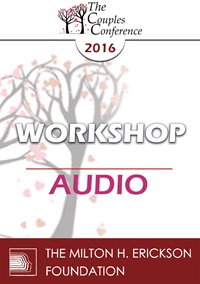
- Average Rating:
- Not yet rated
- Topic Areas:
- Neuroscience | Attachment | Workshops | Experiential Therapy | Mindfulness | Couples Therapy
- Categories:
- Couples Conference | Couples Conference 2016
- Faculty:
- Rob Fisher, MFT
- Duration:
- 01:54:14
- Format:
- Audio Only
- Original Program Date:
- May 13, 2016
- Short Description:
- Now that you understand the neuropsychology of attachment, how are you going to use it in a session where one partner is yelling at the other for abandoning him/her who is in turn trying to take refuge under the coach? Learn how to put theory into practice using an experiential approach to explore old neural circuitry around attachment and build new pathways. We will be using the present moment and mindfulness integrated into therapy to slow things down and rewire the brain.
- Price:
- $15.00 - Base Price
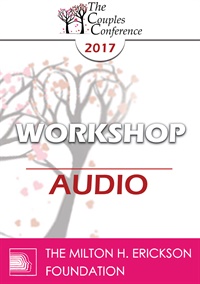
- Average Rating:
- Not yet rated
- Topic Areas:
- Workshops | Attention Deficit Disorder (ADD) | Cognitive Behavior Therapy (CBT) | Neuroscience
- Categories:
- Couples Conference | Couples Conference 2017
- Faculty:
- Daniel Amen, MD
- Duration:
- 1:46:13
- Format:
- Audio Only
- Original Program Date:
- Apr 01, 2017
- Short Description:
- This workshop explores seven distinct types of ADHD through the lens of brain imaging and neurobiology. Participants learn how each type—ranging from inattentive to overfocused or anxious—requires different treatment approaches. The session offers practical, brain-based strategies using nutrition, exercise, supplements, and therapy to improve focus, impulse control, and emotional balance in children and adults.
- Price:
- $15.00 - Base Price
Credit available - Click Here for more information
- Average Rating:
- Not yet rated
- Topic Areas:
- Addiction | Keynotes | Continuing Education | Love | Couples Therapy | Neuroscience | Sex and Sexuality
- Categories:
- Couples Conference | Couples Conference 2018 | Online Continuing Education
- Faculty:
- Helen E. Fisher, PhD
- Course Levels:
- Master Degree or Higher in Health-Related Field
- Duration:
- 57:05
- Format:
- Audio and Video
- Original Program Date:
- May 04, 2018
- Short Description:
- Biological anthropologist Helen Fisher discusses three brain systems that evolved for mating and reproduction: the sex drive; feelings of intense romantic love; and feelings of deep attachment to a long term partner. She then focuses on her brain scanning research (using fMRI) on romantic rejection and the trajectory of love addiction following rejection. She concludes with discussion of the brain circuits associated with long-term partnership happiness and the future of relationships in the dig
- Price:
-
Sale is $29.00
price reduced from Base Price - $59.00
Credit available - Click Here for more information
- Average Rating:
- Not yet rated
- Topic Areas:
- Attachment | Neuroscience | Keynotes | Continuing Education | Differentiation | Couples Therapy
- Categories:
- Couples Conference | Couples Conference 2018 | Online Continuing Education | Pioneers in Couples and Family Therapy
- Faculty:
- Stan Tatkin, PsyD, MFT
- Course Levels:
- Master Degree or Higher in Health-Related Field
- Duration:
- 50:59
- Format:
- Audio and Video
- Original Program Date:
- May 06, 2018
- Short Description:
- This presentation integrates foundational theories of attachment, differentiation, and individuation with current neuroscience to inform a psychobiological approach to couple therapy. Tatkin examines how early developmental models apply to partners with varying social-emotional complexity, highlighting deficits like alexithymia and theory of mind. Clinicians are encouraged to adapt interventions based on cognitive capacity and emphasize face-to-face, collaborative engagement in session.
- Price:
-
Sale is $29.00
price reduced from Base Price - $59.00
Credit available - Click Here for more information
- Average Rating:
- Not yet rated
- Topic Areas:
- Addiction | Couples Therapy | Workshops | Continuing Education | Love | Neurobiology | Neuroscience
- Categories:
- Couples Conference | Couples Conference 2018 | Online Continuing Education
- Faculty:
- Helen E. Fisher, PhD
- Course Levels:
- Master Degree or Higher in Health-Related Field
- Duration:
- 1:57:48
- Format:
- Audio and Video
- Original Program Date:
- May 04, 2018
- Short Description:
- Biological Anthropologist Helen Fisher discusses four broad basic styles of thinking and behaving associated with four primary brain systems: the dopamine, serotonin, and testosterone and estrogen/oxytocin systems. She discusses why people are predisposed to love one person rather than another (mate choice). She hypothesizes that individuals who primarily express of the constellation of traits linked with each of these brain systems may be predisposed to different forms of love addiction, includ
- Price:
-
Sale is $29.00
price reduced from Base Price - $59.00
Credit available - Click Here for more information
- Average Rating:
- Not yet rated
- Topic Areas:
- Keynotes | Neuroscience | Couples Therapy
- Bundle(s):
- CC19 Main Conference Video Bundle | CC19 Individual Selections
- Categories:
- Couples Conference | Couples Conference 2019 | Online Continuing Education | Pioneers in Couples and Family Therapy
- Faculty:
- Stan Tatkin, PsyD, MFT
- Course Levels:
- Master Degree or Higher in Health-Related Field
- Duration:
- 59:40
- Format:
- Audio and Video
- Original Program Date:
- Apr 14, 2019
- Short Description:
- This keynote explores the neurobiology of relational ethics, asking why partners sometimes act against their own or each other’s best interest. Tatkin examines how brain systems governing threat, stress, and reward influence moral behavior, and urges therapists to help couples co-create principles like fairness, transparency, and mutual care—shifting from reactive habits to secure, value-driven relating.
- Price:
-
Sale is $29.00
price reduced from Base Price - $59.00
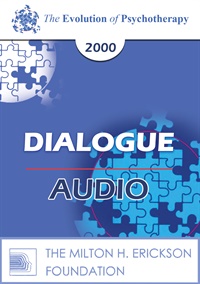
- Average Rating:
- Not yet rated
- Topic Areas:
- Psychotherapy | Dialogues | Neuroscience
- Categories:
- Evolution of Psychotherapy | Evolution of Psychotherapy 2000
- Faculty:
- Judd Marmor | Ernest Rossi, PhD
- Duration:
- 59 Minutes
- Format:
- Audio Only
- Original Program Date:
- May 28, 2000
- Short Description:
- EP00 Dialogue 12 - Facilitating Neurogenesis in Psychotherapy - Judd Marmor, M.D., and Ernest Rossi, Ph.D. Given a topic, to become aware of the differing approaches to psychotherapy, and to identify the strengths and weaknesses in each approach.
- Price:
- $15.00 - Base Price

- Average Rating:
- Not yet rated
- Topic Areas:
- Ericksonian Psychotherapy | Psychotherapy | Invited Addresses | Neurobiology | Neuroscience
- Categories:
- Evolution of Psychotherapy | Evolution of Psychotherapy 2000
- Faculty:
- Ernest Rossi, PhD | Thomas Szasz, MD
- Duration:
- 1 Hour 25 Minutes
- Format:
- Audio Only
- Original Program Date:
- May 28, 2000
- Short Description:
- Current research on neurogenesis (growth of new brain cells) indicates that novelty, environmental enrichment and physical exercise can facilitate new growth in the adult human brain. How can we optimize our Ericksonian approaches to support the psychobiological growth process?
- Price:
- $15.00 - Base Price
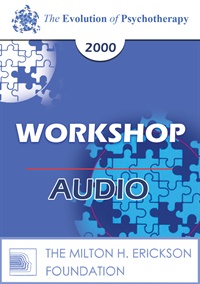
- Average Rating:
- Not yet rated
- Topic Areas:
- Ericksonian Psychotherapy | Neuroscience | Workshops | Ericksonian Hypnosis and Therapy Techniques | Psychotherapy
- Categories:
- Evolution of Psychotherapy | Evolution of Psychotherapy 2000
- Faculty:
- Ernest Rossi, PhD
- Duration:
- 2 Hours 33 Minutes
- Format:
- Audio Only
- Original Program Date:
- May 25, 2000
- Short Description:
- Neuroscientists have proposed that the next ten years be devoted to exploring cognitive approaches to facilitating neurogenesis in the hippocampus of the adult human brain. Let's do it!
- Price:
- $15.00 - Base Price
- Average Rating:
- Not yet rated
- Topic Areas:
- Clinical Demonstrations | Hypnosis | Psychotherapy | Neuroscience
- Categories:
- Evolution of Psychotherapy | Evolution of Psychotherapy 2005
- Faculty:
- Ernest Rossi, PhD
- Course Levels:
- Master Degree or Higher in Health-Related Field
- Duration:
- 59:56
- Format:
- Audio and Video
- Original Program Date:
- Dec 10, 2005
- Short Description:
- Educational Objectives: To describe a novel, simple and easy-to-learn ideodynamic approach to hypnosis and psychotherapy. To describe how experiences of surprise and novelty generate observable minimal behavioral cues, psychobiological arousal, gene expression and brain plasticity.
- Price:
-
Sale is $29.00
price reduced from Base Price - $59.00
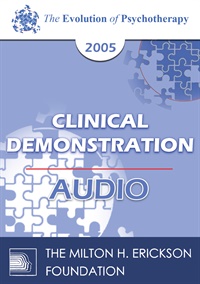
- Average Rating:
- Not yet rated
- Topic Areas:
- Clinical Demonstrations | Neurobiology | Psychotherapy | Neuroscience
- Categories:
- Evolution of Psychotherapy | Evolution of Psychotherapy 2005
- Faculty:
- Daniel Siegel, MD
- Duration:
- 1 Hour 1 Minutes
- Format:
- Audio Only
- Original Program Date:
- Dec 10, 2005
- Short Description:
- Educational Objectives: To name four basic principles of interpersonal neurobiology in relation to the process of psychotherapy. To describe the ways in which the therapeutic relationship shapes brain function in the present, helps loosen old neural maps, and "snags" the brain in order to promote neural activation and growth in very targeted ways.
- Price:
- $15.00 - Base Price
- Average Rating:
- Not yet rated
- Topic Areas:
- Dialogues | Neurobiology | Neuroscience | Psychotherapy
- Categories:
- Evolution of Psychotherapy | Evolution of Psychotherapy 2005
- Faculty:
- Ernest Rossi, PhD | Daniel Siegel, MD
- Course Levels:
- Master Degree or Higher in Health-Related Field
- Duration:
- 59:36
- Format:
- Audio and Video
- Original Program Date:
- Dec 10, 2005
- Short Description:
- Dialogue 10 from the Evolution of Psychotherapy 2005 - The Psychobiology of Change Featuring Ernest Rossi, PHD, and Daniel Siegel, MD
- Price:
-
Sale is $29.00
price reduced from Base Price - $59.00
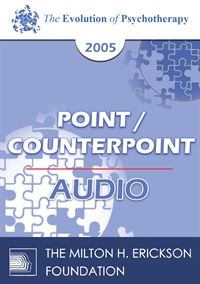
- Average Rating:
- Not yet rated
- Topic Areas:
- Point/Counterpoint Sessions | Hypnosis | Psychotherapy | Neuroscience
- Categories:
- Evolution of Psychotherapy | Evolution of Psychotherapy 2005
- Faculty:
- Ernest Rossi, PhD | Jean Houston, PhD
- Duration:
- 1 Hour 18 Minutes
- Format:
- Audio Only
- Original Program Date:
- Dec 07, 2005
- Short Description:
- The Molecular-Genomic core of therapeutic hypnosis and psychotherapy is identified as the 90-120 minute process that neuroscientists currently term "long term potentiation," which is believed to be the molecular basis of brain plasticity, memory and learning.
- Price:
- $15.00 - Base Price
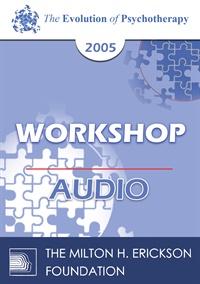
- Average Rating:
- Not yet rated
- Topic Areas:
- Workshops | Ericksonian Hypnosis and Therapy Techniques | Hypnosis | Arm Levitation | Psychotherapy | Ericksonian Psychotherapy | Neuroscience | Hypnotic Phenomena
- Categories:
- Evolution of Psychotherapy | Evolution of Psychotherapy 2005
- Faculty:
- Ernest Rossi, PhD
- Duration:
- 2 Hours 12 Minutes
- Format:
- Audio Only
- Original Program Date:
- Dec 07, 2005
- Short Description:
- Erickson's hand levitation and pantomime techniques have evolved into simple, easy to learn, activity-dependent approaches to therapeutic hypnosis, and are consistent with the theory and research of the current neuroscience on brain plasticity and the molecular genomic level of psychotherapy. Demonstrations with volunteers from the audience will illustrate.
- Price:
- $15.00 - Base Price



